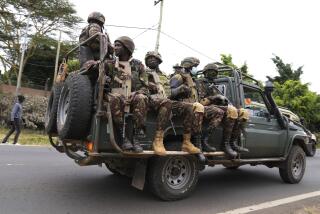ElBaradei joins protesters in Cairo clash with police
Mohamed ElBaradei knelt in prayer, then rose and stepped toward a line of riot police.
The Nobel Peace laureate moved closer, shrinking the gap between the demonstration he was attempting to lead and the power of the Egyptian state. The police officers lifted their batons. They swung. Water cannon streamed. Tear gas bloomed.
The downtown Cairo street erupted, as thousands of protesters, hurling stones and shoes, clashed with police.
ElBaradei, drenched, his eyes stinging, was hurried by friends into a nearby mosque.
“I called for peaceful [change], but I think that opportunity is over,” the opposition leader said minutes later, sitting stunned, tear gas volleys exploding outside. “It’s the people versus the thugs.”
The men around him, other opposition leaders and his bodyguards, were enraged. ElBaradei, who for months had been urged by activists to take his National Front for Change into the streets, held a medical mask over his mouth, his skin still bristling. Rocks and stones peppered the air beyond the courtyard. A man ran in saying that someone had been killed near the overpass.
Two other men, fresh from the street, dropped onto the carpet, gasping, holding onions over their noses to blunt the tear gas.
ElBaradei — who by the end of the day would be placed under house arrest — was far from the polished offices of the diplomats and scientists at the United Nations’ International Atomic Energy Agency, where for years in Vienna he once monitored the world’s nuclear programs.
Egypt is his native land, but it had become a rougher, anxious country, marred by persistent joblessness and poverty and the rage of those with little.
He was back here now, uncorrupted, which is why many Egyptians want him to be their new leader, trying to topple the 3-decade-old government of President Hosni Mubarak.
But outside the mosque, activists, who over the years had gotten used to tear gas and beatings, wondered why ElBaradei was inside. Some thought him too timid. They asked one another: “Where is ElBaradei going?”
“He’s a 68-year-old symbol,” answered Ibrahim Issa, a dissident editor and ElBaradei’s confidant. “He has never experienced something as harsh as this. We’ll have to discuss whether he will go out again or not.”
It was only the night before that he had boarded a plane in Vienna to return to Cairo to be the face of a peaceful revolution. He had resisted the idea of being turned into an icon, but, as thousands of Egyptians held unprecedented street protests in recent days, he decided that they had proved their commitment to winning an end to Mubarak and his ruling party. He told them he would go to the street.
He arrived outside the Istiqama Mosque in the Giza neighborhood of Cairo shortly after Friday prayers began. Young men and boys yelled his name. He appeared with a clenched jaw, the gravity of the moment upon him. He flashed a brief smile and sat, listening to the echo of the preacher over a loudspeaker. Hundreds of police officers tightened their lines. The water cannon truck inched closer. A crowd, like a tiny sea, churning, pushed around him.
ElBaradei and the men stood. They laid newspapers on the ground and prostrated themselves in prayer. Women looked down from high-rise windows. Cars disappeared from the overpass. The police lines deepened. ElBaradei and his men stood and walked toward them. The response was swift, bamboo sticks welted the air. ElBaradei and his supporters rushed for refuge.
A journalist told him the world was listening.
ElBaradei answered that the government had “closed the doors” for peaceful transition and that by the attacks of its security forces was “telling people they have to revolt.... I hope the pictures will be everywhere to show how barbaric and petrified” the government is.
He regained his composure, saying, “It is now for the international community to express its views on the so-called stability of the Egyptian government. If they don’t do that now, they will lose the residues of credibility they have in Egypt and the rest of the Arab world.”
In a comment aimed at the United States, a Mubarak ally with whom ElBaradei sometimes had a fractious relationship as head of the nuclear monitoring agency, he said: “Practice what you preach” when it comes to freedom, justice and the rule of law.
Police outside rushed the protesters. A white shroud of tear gas hovered in the air. Flames erupted from a car. Demonstrators threw rocks and police hurled them back.
The crowd lunged forward. The police pushed. The gap between them was streaked with scattered stones, water and canisters. The tear gas thickened again. It billowed toward the mosque. Protesters rushed inside.
One woman, though, would not break the religious custom of respect even amid danger: She took off her shoes before stepping onto the carpet as men pushed her from behind.
Tear gas filled the prayer room.
ElBaradei’s men moved him to a safer place upstairs. He disappeared into the shadows.
Amro Hassan in The Times’ Cairo Bureau contributed to this report.
More to Read
Sign up for Essential California
The most important California stories and recommendations in your inbox every morning.
You may occasionally receive promotional content from the Los Angeles Times.









